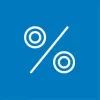The terms fixed deposit, term deposit and time deposit all denote special bank accounts the balances of which are frozen and cannot be withdrawn during a predetermined fixed term. You earn interest on your deposit at a fixed rate across the full term. In Switzerland, the term fixed deposit is primarily used for fixed deposits with fixed terms of 6 months to 1 year. The terms time deposit and time deposit account are commonly used for fixed deposits with terms above 1 year.
The interest rate is set at the start of the investment term. Interest is paid out at predetermined intervals. It is possible to withdraw your money before the end of the fixed term, but you pay penalty fees when you do this.
Medium-term notes explained
Medium-term notes In Switzerland, medium-term notes are more widely used for medium-term investments than time deposit accounts. A medium-term note is a type of security issued by banks (and some other entities) which pays interest at a fixed rate over a fixed term. In Switzerland, medium-term notes are issued with terms of between 1 and 10 years. In addition to standard medium-term notes in Swiss francs, some Swiss banks also offer euro-denominated medium-term notes.
Medium-term notes are securities (like bonds and shares). Swiss medium-term notes are now primarily issued in book form rather than as physical certificates. Because of this, they must be held in custody accounts.
Fixed deposits explained
Swiss fixed deposits are very similar to medium-term notes in that they pay fixed interest over fixed terms. Both fixed deposits and medium-term notes issued by banks are covered by the Swiss bank depositor protection scheme against bank failures. The only significant difference between fixed deposits and medium-term notes is that fixed deposits are bank accounts (like private accounts and savings accounts), while medium-term notes are securities.
Fixed deposits vs. medium-term notes
Fixed deposits are bank accounts and not securities. As such, they do not require safekeeping services from a custodian bank, which is the case with medium-term notes.
Another possible advantage of fixed deposits is that it is technically possible to open accounts with custom terms. For example, a fixed deposit could theoretically have a fixed investment term of 3 years, 3 months and 2 days. The UBS time deposit account is one example of a flexible fixed deposit solution. Medium-term notes, on the other hand, are standardized securities with standardized investment terms.
Some banks charge custodial fees to hold medium-term notes, while others hold their own medium-term notes free of charge. At banks which charge custodial fees, costs range between 0.05% and 0.2% of the medium-term note principal. Custody accounts may have minimum custodial fees, and in the case of small investments these can be high compared to the medium-term note principal. Some banks require that you hold a private account or savings account with them in order to buy their medium-term notes. In this case you should account for the costs of the private account in relation to other Swiss private accounts or the interest paid in relation to other Swiss savings accounts.
Important: Although custodial fees do not apply to fixed deposits, fixed deposit accounts may have fees and charges. There are also fixed deposits which do not have any fees or charges attached.
Custodial fees and other possible fees and charges are accounted for in the Swiss fixed deposit and medium-term note comparison.
Some banks (like Raiffeisen) offer both medium-term notes and fixed deposits.
More on this topic:
Compare Swiss fixed deposits and medium-term notes in francs or euros now

 Deal of the Day
Deal of the Day 




